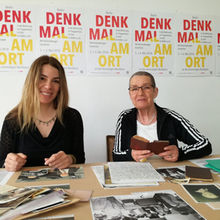The Encounter with Mrs. Charlotte S. Grünberg: A Glimpse into a Remarkable Journey
- Ilana Lamstein

- Oct 6, 2023
- 4 min read
Updated: Aug 15, 2024
With much affection and gratitude, I share a brief interview conducted with Mrs. Charlotte S. de Grünberg Z''L for the Magazine of the Uruguayan Friends of the Hebrew University of Jerusalem in Uruguay (2018).
I will always remember her generosity, her warm and respectful manner, and her inspiring example of overcoming in life

Meeting Mrs. Charlotte de Grunberg, The General Director of the ORT University in Uruguay, a privilege granted to only a few. Behind the petite and elegant silhouette of this extraordinary woman, with her penetrating gaze and steadfast demeanor, lies a human being filled with sensitivity and love. Her life experience serves as an example of determination in the face of adversity and a belief in the potential of humanity. In this article, I share a part of this enriching encounter.
Charlotte, please tell us about your beginnings at ORT.
My connection with ORT dates back to 1979 when I pursued teaching English and French as second languages. I held a deep interest in the realm of second language instruction, which led me to France for specialized training using audiovisual systems. At the time, the sole language laboratory in Montevideo was at ORT.
This contact prompted ORT to propose a study to understand why the laboratory had not yielded satisfactory results. The findings reached ORT's global headquarters, and after six months, I began working on launching the laboratory. In the inaugural year, I trained educators in the basics of audiovisual teaching techniques, and 100 students enrolled in English classes using this method. Following this period, I was offered the position of general director of the organization.
This marked my first experience within a Jewish organization, which originated in 1880 in Russia as a vocational school aimed at helping Jews escape ghettos and establish livelihoods. ORT played a pivotal role in the establishment of the State of Israel by fostering secondary schools.
Can you describe the journey ORT undertook to evolve into a prestigious university known for academic excellence?
When I joined ORT, it offered technical courses and classes for students in their final two years of secondary education. This encompassed a total of around 150 students across both divisions. Over time, ORT gained recognition as a technical high school. In the early 1980s, the Creative Education initiative was launched to introduce technology, arts, and crafts to preschool and primary education.
As ORT transitioned into a Technological Institute, we supported schools through projects, lab installations, and dispatched educators to better prepare students for higher education. We anticipated the rise of cutting-edge technology. In the upcoming year, ORT will celebrate its 75th anniversary since its establishment in Uruguay in 1942. We are now in our 20th year as the country's foremost private university, following the enactment of the university law.
During the presentation of your book "The Girl Who Watched the Trains Depart" to Engineer Ruperto Long, you mentioned the concept of a "pedagogical reality," among other notable points. Could you elaborate on this expression and the idea it conveys?
Much is known about the Holocaust, yet little is understood about the stories of hidden children, which mirrors my own experience. Presently, this reality prevails with children leaving their homes in various corners of the world, seeking survival without their parents. What kind of life awaits them? I deeply empathize with these children who may not be hidden but are similarly without their parents to guide them. Organizations like ORT were present in the Warsaw Ghetto.
The concept was that educated individuals, escaping the ghetto, would need to sustain themselves. At the time, nobody anticipated both the ghetto's liquidation and the fate of those on the trains I watched pass by. The ordeal of obtaining study materials for children remains a challenge today. After relentless efforts, the Ministry of Education and Culture accepted ORT's proposal to offer Shoah courses to state high school teachers every two years, focusing exclusively on the Holocaust.
We must differentiate between the Holocaust and the Ganges River. It is not that the Holocaust isn't a genocide; rather, it is a unique genocide, extensively studied by Jews themselves, regardless of whether they were direct victims. We made it our duty to educate through studies and films, reclaiming what Nazism sought to suppress.
How can you continue to believe in humanity after the Holocaust?
To lose faith in humanity is to surrender living. Belief in humanity and education must endure.
The individuals attending German universities, which I refer to as "diabolical beauties," who later embraced Nazism, were influenced by the ideology. Eminent philosophers within these universities succumbed to Nazism. This underscores that persecution does not necessitate walls or ghettos. Education should be our focal point.

I share with you the reflection sent to me by Mrs. Charlotte S. Grünberg on the occasion of the publication of my book "Hasta que no estés en su lugar", Traces of the Jewish Holocaust, in the memory of Mónica Wartenberger, daughter of survivors:
"I read your book and congratulate you on achieving the translation into German. I hope it will be successful in Germany and elsewhere. The last direct victims of Hitler and Auschwitz are disappearing... The historically proven account over the years must be an imperative of the unique nature of the event, despite the distortions that arise through social media, some of which are completely divorced from historical truth. With the disappearance of the testimonies of the direct experiences of the survivors, the emotion provoked by these accounts disappears inexorably. How to face it? The memory of the Shoah must remain indispensable for future generations. For all humanity, because in the era of social media and immediacy, time must be invested in thinking and making young people reflect".









